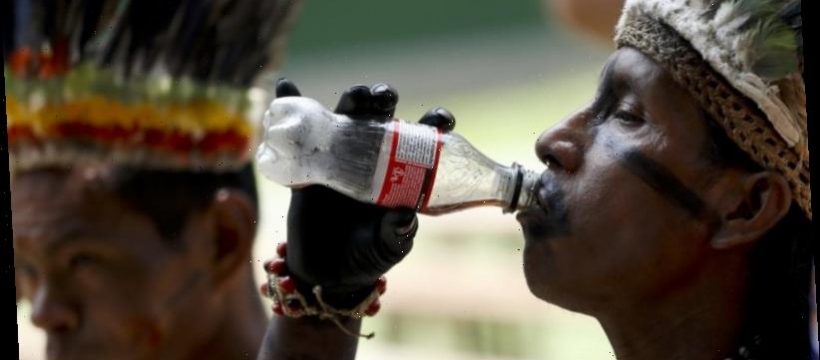Brasilia: A doctor working with the largest indigenous group in the Amazon has tested positive for the coronavirus, Brazil's Health Ministry said on Friday, ringing alarm bells that the epidemic could spread to vulnerable and remote indigenous communities with devastating effect.
The doctor, who has not been named, had returned from holidays on March 18 to work with the Ticunas, a group of more than 30,000 people who live in the upper Amazon near the borders with Colombia and Peru.
He developed a fever later that day and went into isolation, testing positive for the respiratory disease COVID-19 a week later, the ministry said.
A representative of the Huitoto and Ticuna indigenous communities drinks Coke in Leticia, on Colombia’s Amazon river border with Brazil and Peru. A doctor working with the Ticunas has tested positive for coronavirus.Credit:AP
Eight tribe members he treated on his first day back working for the indigenous health service Sesai have also been isolated in their homes and are being monitored, the ministry said.
The doctor's infection is the first confirmed case of the virus directly present in an indigenous village. It raises fears of an outbreak that could be lethal for Brazil's 850,000 indigenous people that have a history of decimation by diseases brought by Europeans, from smallpox and malaria to the flu.
Health experts say their way of life in communal hamlets under large thatched structures increases the risk of contagion if any single member contracts the new coronavirus. Social isolation is hard for tribes to practise.
The ministry said the doctor had no symptoms when he returned to work using a protective mask and gloves, but quarantined himself as soon as he developed a fever.
News website G1's columnist Matheus Leitão reported that the doctor is Brazilian and may have caught the virus while vacationing in southern Brazil or on the boat ride up the Amazon to his work place at Santo Antônio do Içá.
So far, Sesai has reported four suspected cases of the coronavirus in indigenous communities, with only one in the Amazon.
But doctors fear the virus could spread fast among tribes whose immune systems often are already weakened by malnutrition, hepatitis B, tuberculosis and diabetes.
About a third of indigenous deaths in Brazil are caused by existing respiratory diseases.
The H1N1 epidemic in 2016 killed hundreds of indigenous people, mainly of the Guarani tribe in the colder south of Brazil, where about half of them caught the bug.
The news come as the Brazilian federal government launched an advertising campaign against social distancing measures to fight the outbreak, the latest flashpoint in a battle between President Jair Bolsonaro and state governors.
The "#BrazilCannotStop" television ad – featuring a slogan similar to a campaign in Milan before deaths in Italy soared – shows scenes of crowded classrooms and street markets.
Brazilian governors and health authorities are at odds with President Jair Bolsonaro, above. Bolsonaro has called the pandemic a momentary, minor problem, saying strong measures to contain it are unnecessary.Credit:AP
"For the neighbourhood salesmen, for the shop owners in city centres, for domestic employees, for millions of Brazilians, Brazil cannot stop," the ad said.
Defying public health experts, Bolsonaro has argued for reopening schools and putting Brazilians back to work, scoffing at "hysteria" surrounding the virus he calls "a little flu."
His position has undermined measures taken by state governors and city mayors to ban non-essential commercial activities and public services to contain the outbreak.
Confirmed coronavirus cases in the country jumped to 3417 on Friday from 1891 on Monday, as related deaths climbed to 92, according to the Health Ministry. Bolsonaro has suggested the economic costs of lockdowns are more deadly.
Brazil's central bank on Friday called for emergency bond-buying powers in line with 'quantitative easing' policies in other countries, while unveiling a 40 billion reais ($8 billion) credit line to help smaller companies with payroll.
Economy Minister Paulo Guedes also said the government would offer 45 billion reais ($14 billion) to self-employed and informal workers, part of a total 700 billion reais in measures over three months.
The TV advertisement, shared on social media by Bolsonaro allies including his son, Senator Flavio Bolsonaro, was commissioned by the President's office at a cost of 4.9 million reais without consulting the Health Ministry, according to two people with knowledge of the matter.
Sao Paulo Governor Joao Doria, a former Bolsonaro ally who has clashed with the President over his handling of the crisis, called the ad "disinformation".
"More than 50 countries are in quarantine. So the whole world is wrong and the only person who is correct is President Jair Bolsonaro?" he said on Friday. "Brazil can stop to lament the irresponsibility of some people."
Bolsonaro's popularity has slipped as opinion polls show most Brazilians siding with governors. Many people across Brazil bang pots and pans in their windows nightly in protest.
In counter protests on Friday, Bolsonaro supporters drove honking caravans through major cities to oppose the lockdowns, sharing videos on social media with the #BrazilCannotStop hashtag.
The slogan is similar to #MilanWillNotStop, which became popular in northern Italy in February. Italy went on to become a global focus of the outbreak, with more deaths than China.
The mayor of Milan, Beppe Sala, has said he regretted sharing the hashtag.
"Many have referred to that video with a hashtag #MilanWillNotStop. It was a video which went viral on the internet. Everyone was sharing it, I also shared it, rightly or wrongly, probably wrongly," Sala said.
Reuters
Source: Read Full Article


